InterPlanetary File System (IPFS) is a dedicated protocol for storing and sharing data in decentralised applications like blockchain. It seeks to make the Internet more free, open, secure, and high performance. It works on the Go and JavaScript programming languages. Discover more about IPFS in this article.
The smart gadgets in use today run on high performance operating systems like Android, iOS, Windows, Blackberry, Tizen, Lune OS, Kai OS, and many others. With the increased use of such platforms, there is a greater need for security and integrity, for which blockchain technologies are now being adopted.
In classical Web applications, a centralised Web server is deployed. Centralised Web apps with a single server, cloud or data centre are deployed for many services including e-governance, medical records management, academic institutional management, the corporate sector, etc. There are numerous vulnerabilities in these traditional Web based applications deployed on centralised Web servers.
In these scenarios, all users or remote systems access the Web services using their Web client application, which includes assorted Web browsers. The major problem in this type of environment is the centralisation; so if the server fails or is hacked, the entire network environment gets compromised.
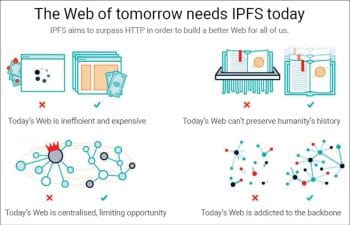
In deployments in which only one server or a few more replicated servers are hacked, all data can be leaked out, copied or destroyed, and this is the major issue with centralised servers. To avoid this, there is a specific implementation that uses a decentralised Web.
In a decentralised Web, there is no central repository of data or applications. Blockchain technology only uses a decentralised Web. The data and applications are stored at multiple places and regions using blockchain technology to ensure security and privacy.
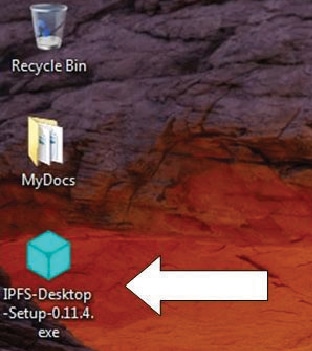
Blockchain technology deploys decentralised apps or dApps
In a decentralised Web, the data is stored on every node or system using that network. In the blockchain environment, there is no threat of data loss because the chain of nodes (blockchain) is immutable (unchangeable) and all blocks are interconnected with a dynamic hash (encrypted text). The blocks in the blockchain environment are programmed with high performance protocols so that they become immutable and cannot be hacked or modified by any third party intruders or sniffers.
Decentralised platforms for blockchain implementations
There are hundreds of distributed cloud platforms that can be used for blockchains. Table 1 features the main decentralised platforms for blockchain based cloud integrations with the official URL.
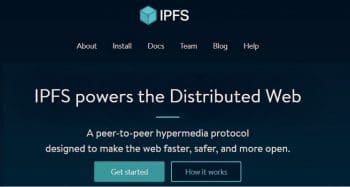
InterPlanetary File System (IPFS): Blockchain based Hypermedia Protocol with peer-to-peer communication
There are separate, highly secure file systems and protocols that work with the blockchain environment. An important one for the decentralised/distributed Web/distributed cloud is IPFS or InterPlanetary File System (https://ipfs.io/), which is a dedicated protocol for applications.
In traditional Web based environments, the Web application or service is accessed using Hyper Text Transfer Protocol (HTTP), as in http://www.rediff.com, http://www.google.com, http://www.du.ac.in, etc.
In the case of blockchain based file systems, the protocol of IPFS is used with a dynamic hash key with secured encryption, as follows:
- ipfs://QmUDT1jRPuaiZYky1k fvoMWoWdFLqrJiu NDRvM vYc8ohW2
- ipfs://QmUDT1jRPuaiZYky1 kfvoMWoWd FLqrJiuNDRv MaYc8ohW2, etc.
The use of IPFS makes the entire communication secure and anonymous. The senders and receivers can communicate and share the documents in secured channels of the blockchain.IPFS can be installed and implemented with the following:
- IPFS desktop
- Command-line install
- IPFS Companion for browsers
- IPFS Cluster for Big Data and server deployments
| Decentralised platforms | Official URL |
| IPFS | sia.tech |
| Sia | storj.io |
| Iagon | iagon.com |
| Cubbit | cubbit.io |
| IExec | iex.ec |
| PPIO | pp.io |
| Opacity | opacity.io |
| BTFS | bittorrent.com/token/bittorrent-file-system |
| NeoFS | fs.neo.org |
| Dfinity | dfinity.org |
| Solana | solana.com |
| Blockstack | blockstack.org |
| SafeNetwork | safenetwork.tech |
The development versions of IPFS are available in variants of the Go language and JavaScript. These developmental versions are used by developers to create and work on private blockchain environments for corporate and Big Data based applications. Many blockchain based deployments use Go language because of its high performance — fast compilation speed, dynamic error checking, scalability, simplicity, garbage collection, etc.
The desktop version of IPFS is available for multiple operating systems and can be deployed for blockchain based implementations. IPFS can be installed on the Windows operating system by downloading it from https://github.com/ipfs-shipyard/ipfs-desktop.
The following commands can be used to install IPFS using various package managers:
Chocolatey: choco install ipfs-desktop
Homebrew: brew cask install ipfs
Snap: snap install ipfs-desktop
Cloud integration for blockchain scenarios
The cloud integration of IPFS can be implemented using the Ethereum blockchain platform. This will ensure a higher degree of security in overall communication networks. Once IPFS is integrated, the dashboard is displayed and is used to share the files on the blockchain network, as shown in Figure 5.
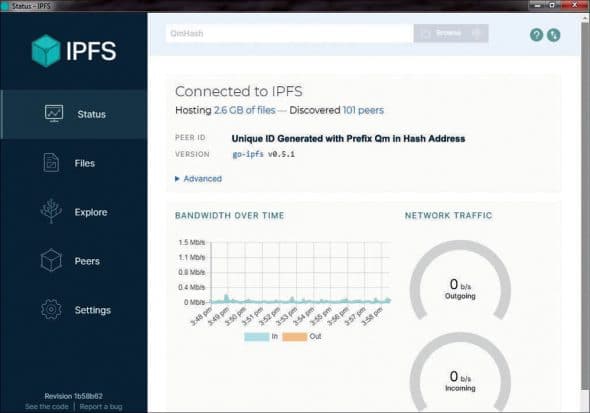
Using this approach, the entire communication in an IPFS based blockchain environment can be fully secured and all the addresses are encrypted. As shown in Figure 5, the address of file ss.txt has a unique encrypted hash address with prefix Qm. The remaining part of the address denotes the assorted properties of the file. Communication in blockchain using IPFS is thus encrypted and peer-to-peer communication is achieved with higher integrity and security.
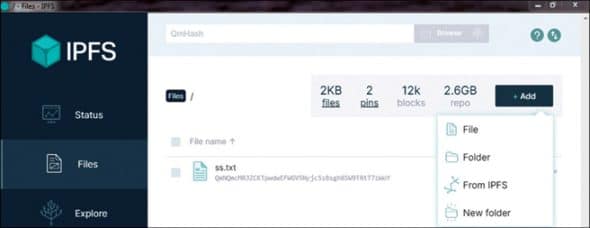
Scope for research and development
There is huge scope for research in blockchain technologies for scholars, professors and practitioners. As e-governance services are the most commonly targeted by hackers, crackers and sniffers, these platforms can be secured using advanced decentralised cloud technologies. Performance evaluation and comparison with traditional Web environments can be done by deploying these services on decentralised clouds. In addition, this type of implementation reduces the scope for corruption in Web based services because there is no single administrator and all the communications are transparent, with no possibility for manual or accidental modifications in the records.















































































